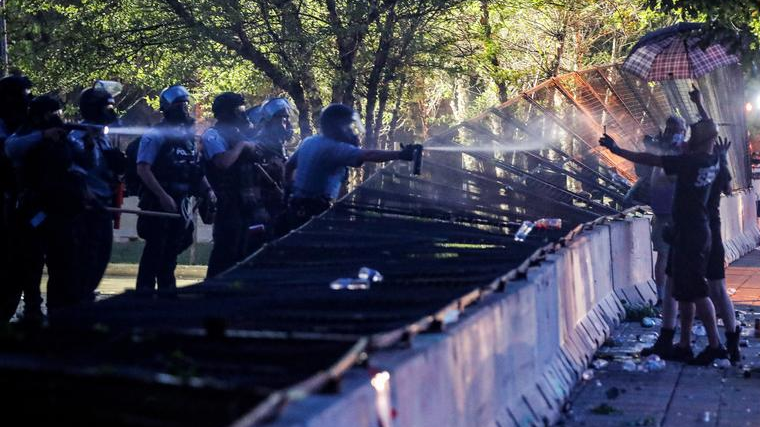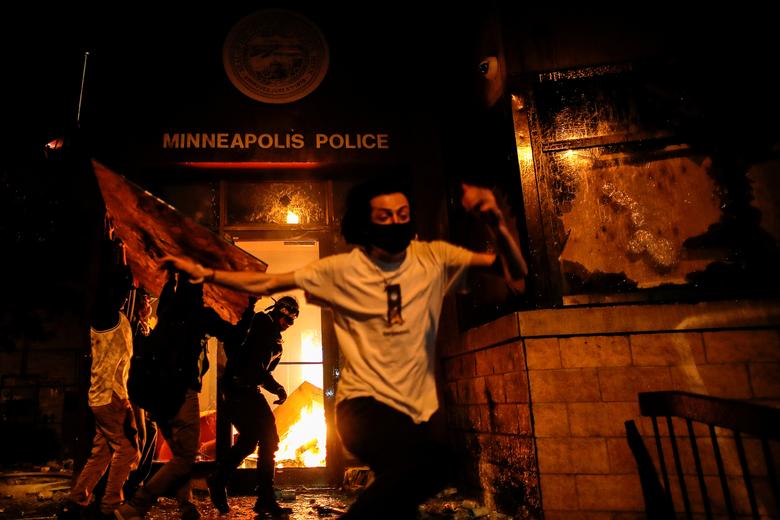
Police fire pepper spray at protesters as demonstrations continue in Minneapolis, U.S., May 28,2020. /Reuters
Police fire pepper spray at protesters as demonstrations continue in Minneapolis, U.S., May 28,2020. /Reuters
Editor's note: Bradley Blankenship is a Prague-based American journalist, political analyst and freelance reporter. The article reflects the author's opinions, not necessarily the views of CGTN.
The United States is undergoing a watershed moment as protests that were sparked in Minneapolis over the extrajudicial killing of George Floyd by a white police officer spill across the nation.
Protests are raging across the country in intensity never before seen – the civility of American decorum evidently broken and the state willing to resort to innovative forms of repression to quell the popular uprising. If this were any other country, Western countries would be intervening through their media turned propaganda networks or worse.
The Washington Post's Karen Attiah penned an op-ed titled "How Western media would cover Minneapolis if it happened in another country," which gave a comical but also very sinister insight to the double-standards the West, particularly the United States, applies to its own civil unrest.
"In recent years, the international community has sounded the alarm on the deteriorating political and human rights situation in the United States under the regime of Donald Trump," Attiah writes, going on to use charged words and phrases like "former British colony," "regime," "state security forces" and others commonly deployed against non-Western countries.
Most Western media houses are selective about the language they use because language matters. It carries with it certain assumptions, conceptual frameworks, emotional connections, cultural idiosyncrasies, and of course, carefully packaged prejudices.
Attiah did a great job showing us the verbal playbook, but what is perhaps more interesting is asking how Western countries would materially respond to such civil unrest if it happened elsewhere in the world, especially if the military were firing live ammunition at protesters as U.S. President Donald Trump has made clear that he would allow. How would Western countries respond to such actions somewhere else?
Here's a scenario:
Following the initial round of protests stemming from the extrajudicial killing of an unarmed black man, the international community (the West) would place sanctions on key officials linked to the state security forces – namely National Guard chief Joseph Lengyel, Defense Secretary Mark Esper, Secretary of the Army Ryan McCarthy and others – before sanctioning American "dictator," Donald Trump.
The "regime's" assets across the world would be frozen to halt crackdowns against pro-democracy protesters. Embassy employees from several countries calling on Trump's "regime" to halt its violence against civilians would quietly leave due to "security risks."

Protesters set fire to the entrance of a police station as demonstrations continue in Minneapolis, May 28, 2020. /Reuters
Protesters set fire to the entrance of a police station as demonstrations continue in Minneapolis, May 28, 2020. /Reuters
In a last-ditch effort to quell protests escalating into riots in response to state-imposed curfews, police brutality, suppression of speech and restrictions on movement, the embattled "regime" of Donald Trump would fire on civilians.
Western journalists would be embedded within the opposition, hearing their accounts of the crimes committed by the butcher, Donald Trump, who is killing his own people.
After the media begins hosting retired generals, the public would be prepped and ready to support a "humanitarian intervention," all the while the militant wing of protesters would be quietly receiving weapons and put on the payroll of clandestine agencies. State security forces would be encouraged to defect from their posts and join the armed opposition, as sanctions choke the state's ability to pay its workers and soldiers before tensions escalate.
Now with weapons, resources, an international spotlight, favor with Western governments and professional military leaders, the opposition – termed moderate rebels – would seize on the opportunity to strike against the security forces, marking the official beginning of a civil war.
The Trump "regime" would lose its monopoly on the legitimate use of violence, thus creating a divide in sovereignty. Foreign NGOs would be behind the opposition, providing humanitarian aid, while clandestine agents use these organizations as a front to enter the country.
Pundits, now working around the clock in the media, would stress to Western countries the need for a "red line" to be drawn for the Trump "regime" – setting the stage for a full military intervention. A naval blockade would surround the United States to halt trade with the embattled "regime" as Western militaries wait for any opportunity to seize.
Meanwhile, political dissidents would form a political body, vetted by Western intelligence and with a political program designed by Western political scientists that would be immediately recognized as the interim government of the United States.
If the "regime" continues on with the 2020 election, all Western analysts will say it's rigged. If the "regime" doesn't continue with the elections, Western analysts will decry a suppression of democratic rights. Here's probably the point that Trump would lose all legitimacy, given that his only legitimate right to power – an election – would be called into question.
As protests and opposition attacks mount in response to a report from some Western NGO, the red line would inexorably be crossed – probably some use of weapons of mass destruction utilized by either side, but ultimately blamed on Trump's military. Just like that, Trump would be toppled by a full-scale invasion.
(If you want to contribute and have specific expertise, please contact us at opinions@cgtn.com.)